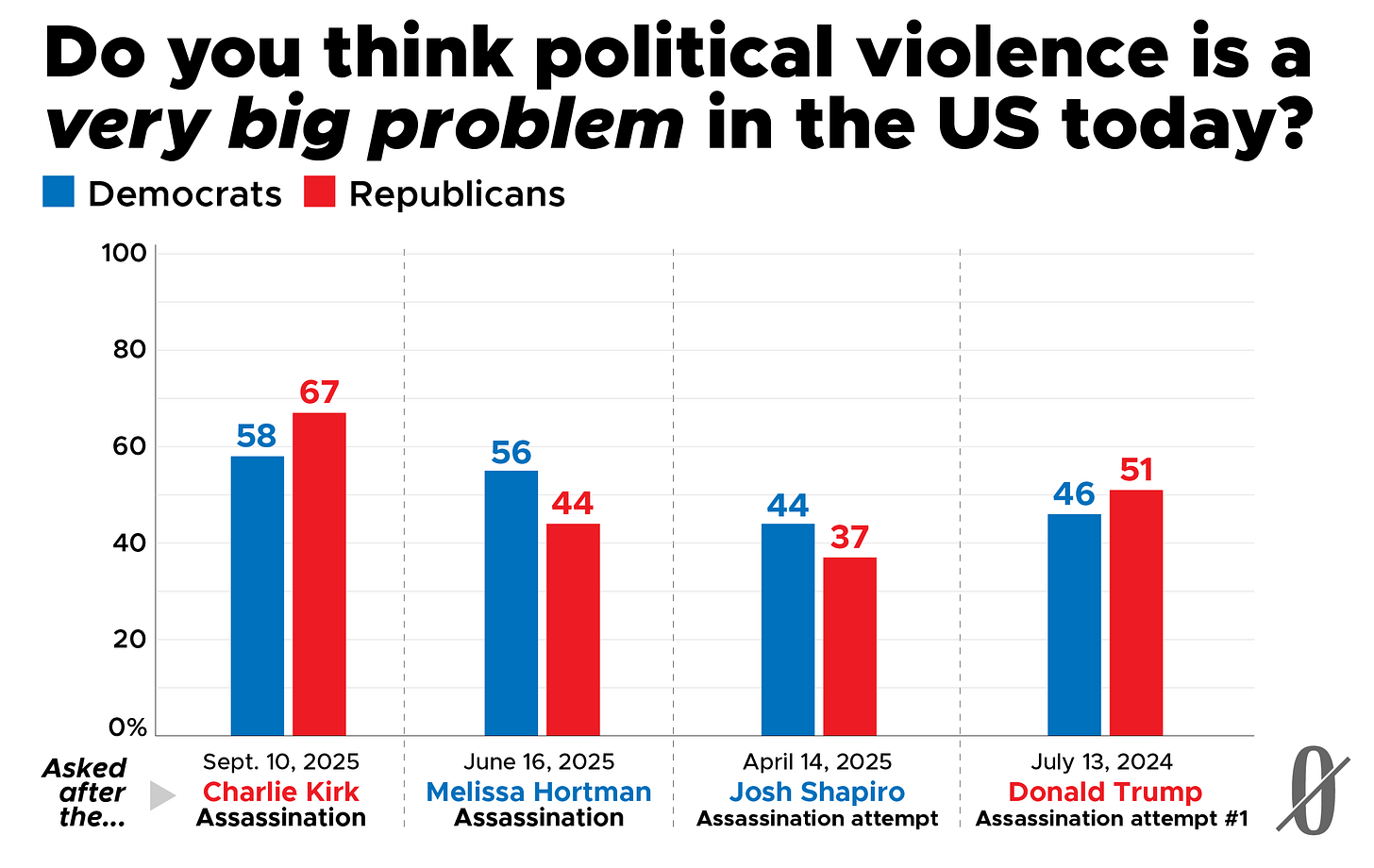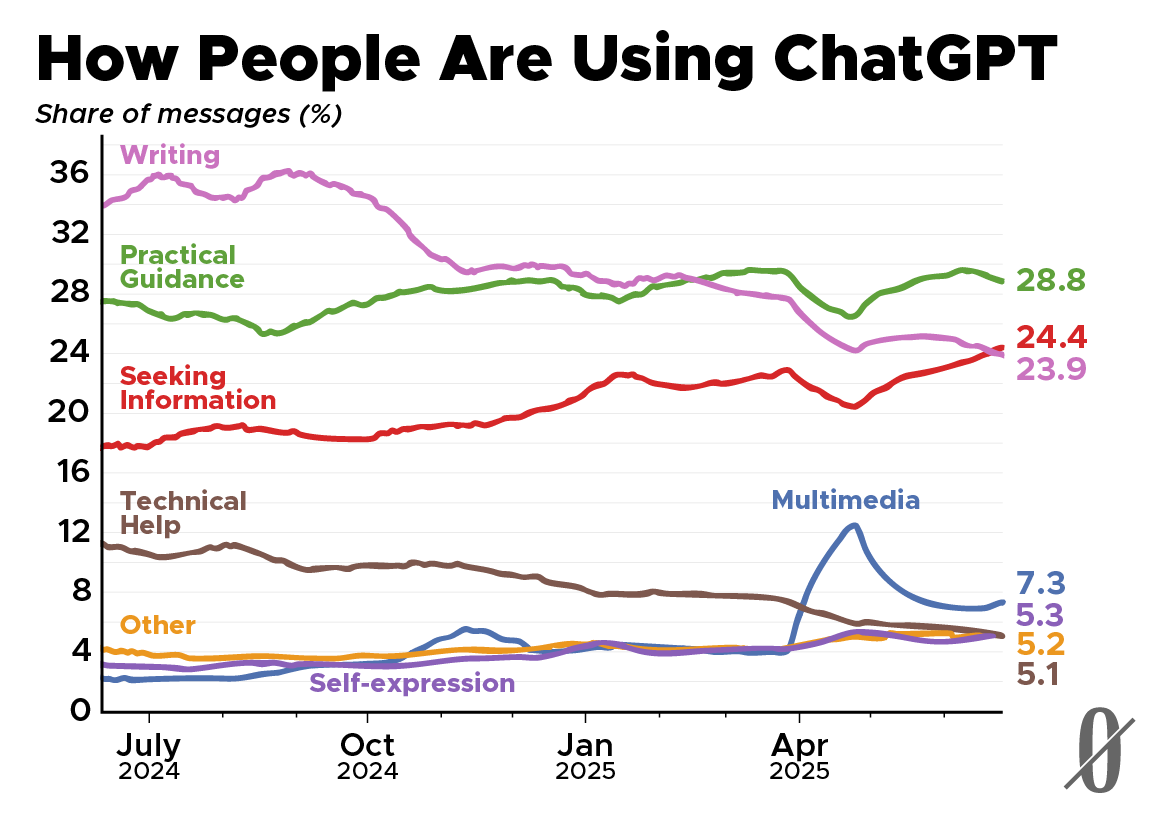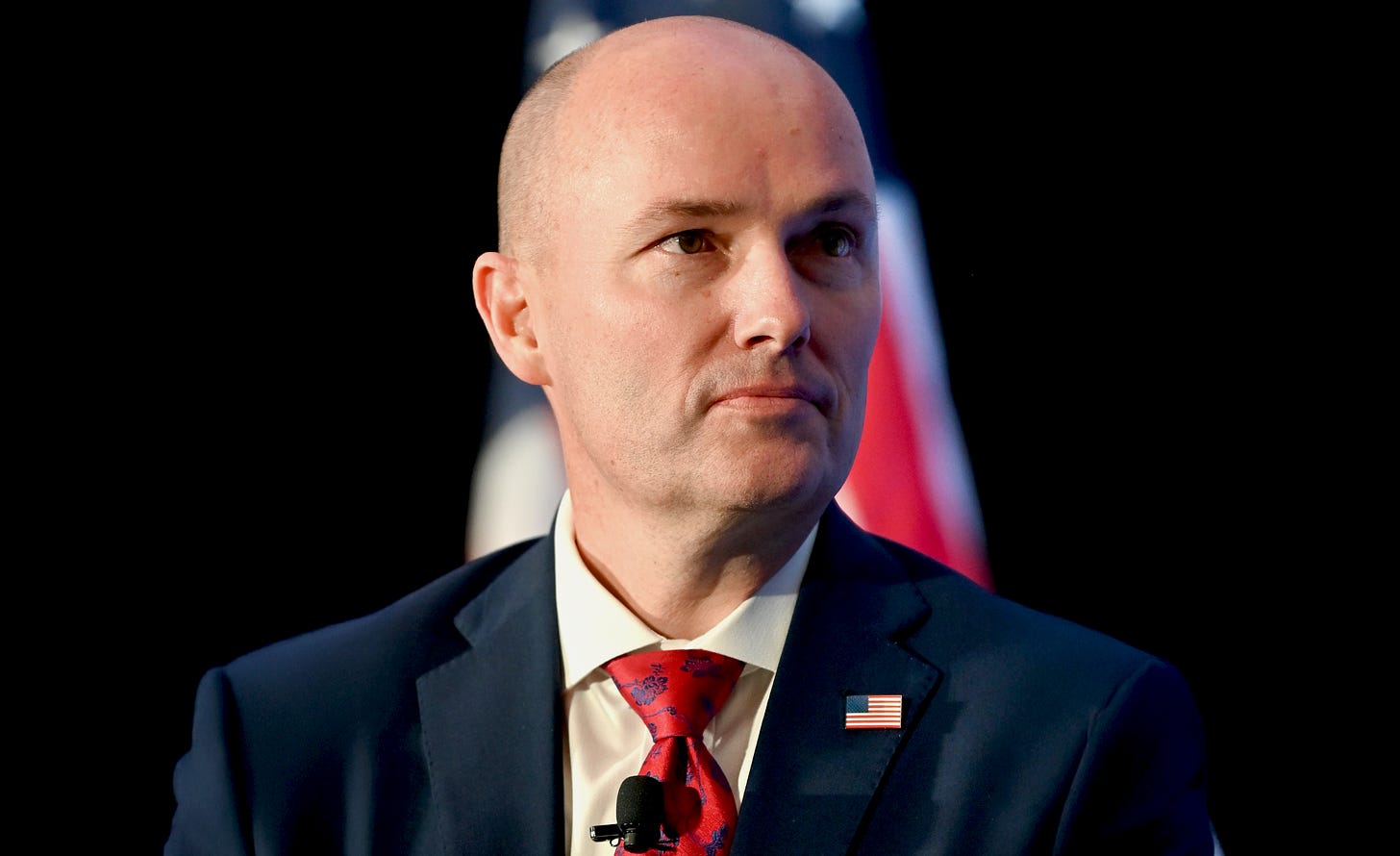Spencer Cox for President?
Plus: Chatbot homewreckers; Slippery Palantir; Gaza’s grim climax; Trump’s fake Caribbean drug war; Conflict entrepreneurs; and more!
Note: Tomorrow—Saturday, Sept. 20, at 1 pm US Eastern Time—I and two other members of the NZN team will be holding a Zoom call with NZN members (sometimes crassly referred to as paid subscribers) about NZN’s mission: what the mission is, how recent events on both the domestic and international scene relate to it, and how we can better pursue it. We’re open to any and all relevant ideas you may have (including ideas about roles you might want to play in the mission). We’re also looking for not-necessarily-mission-related-feedback—like, how you think our newsletter and podcasts could be improved generally, which parts of them you do and don’t like, etc. So please join me and Nikita Petrov and Danny Fenster. The link to the zoom call is at the bottom of this newsletter, below the (to put it crudely) paywall.
If Vice President JD Vance is the next occupant of the Oval Office, as many Republicans hope, will he be as big a threat to American democracy as the current occupant is proving to be? In the wake of the Charlie Kirk assassination, Vance has provided some clues.
On Monday, while serving as substitute host of the Charlie Kirk show, Vance denounced an article about Kirk in The Nation that he said had set out to “justify his murder.” He then asked, “Did you know that the George Soros Open Society Foundation and the Ford Foundation, the groups who funded that disgusting article justifying Charlie's death… benefit from generous tax treatment? They are literally subsidized by you and me, the American taxpayer, and how do they reward us? By setting fire to the house built by the American family over 250 years.” It was time, Vance said, to “dismantle the institutions that promote violence and terrorism in our own country.”
Among the problems with Vance’s riff were that (1) The Nation article, while harshly critical of Kirk, hadn’t “justified” his murder and in fact included this line: “I do not believe anyone should be murdered for their views.” (2) According to the Washington Post, neither the Ford Foundation nor the Open Society Foundation has given money to the Nation in more than five years.
If Vice President Vance is willing to exercise this much creative license in constructing the rationale for an authoritarian crackdown, the range of circumstances that a President Vance might exploit to tighten the screws could be vast. This points to one problem with the common hope that if the country can just survive three more years of Trump, the recovery of liberal democracy can begin: Trump’s most likely replacement on the Republican ticket seems to be about as disrespectful of liberal democracy as Trump is and as unscrupulously demagogic as he is and, unsettlingly, smarter than he is.
As it happens, this week also brought discussion of a new Republican presidential prospect who is in important respects roughly the opposite of Trump and Vance: Spencer Cox, governor of the state where Kirk was killed. “Cox has become something of a national star in the past few days,” observes the British newspaper The Independent, as “his level-headed response” has stood in contrast to the tone emanating from Trump’s White House.
Cox, who speaks soberly and politely and exudes a nearly archaic sense of decency, has called for tamping down hostility on both sides of America’s tribal divide. Shortly after the Kirk killing, as Trump was saying “We have radical left lunatics out there and we just have to beat the hell out of them,” Cox was saying, “This is our moment: Do we escalate or do we find an off-ramp? It’s a choice.” This theme wasn’t something he concocted for the occasion; it’s long been a big part of his brand. In the 2020 election, he and his Democratic opponent put out ads in which both promised to “disagree without hating each other.”
Could Cox, who looks like he’d feel right at home in the Eisenhower administration, really become president in the Trump era? This week The Hill ran a piece about him and his message of national healing, reporting that “political observers and journalists alike have taken note, prompting some speculation about his future.” But of course, to become president you have to run for president, and the Hill quoted a University of Utah political scientist who doubts that’s in the cards. “I don’t think he was somebody who got into politics to get into office and then think about the next office and think about the next office.”
That, the professor added, is one reason Cox can stick with an anti-tribal message. If you were running for higher office, “at least in the current Republican Party, you would shape that message differently.”
And in the current Democratic Party, too, I’d guess. But who knows? Maybe if things get scary enough, more people in both the red and blue tribes will resonate to a message of concord. And things are getting scarier.
—RW

A “conflict entrepreneur” is someone who exploits or inflames conflict to gain power or status or money. The term was coined in the 1990s in the context of violent conflict and was repurposed in Amanda Ripley’s 2021 book High Conflict to apply more broadly, encompassing things like political conflict. And this week the term got a workout.
More than one news outlet reported that Utah Governor Spencer Cox had called Steve Bannon a conflict entrepreneur after Bannon said that Cox is “a national embarrassment. In a time where we need action he tells us to sing Kumbaya and hold hands with Antifa.”
Those reports were wrong. Cox had said on CNN, after being confronted with Bannon’s quote, “There are conflict entrepreneurs out there who benefit from radicalizing us. I’m not one of those.” And if you look at the video, it’s pretty clear that wasn’t a reference to Bannon. In fact, this line came near the end of Cox’s answer about Bannon—which began with him saying, characteristically, “Mr. Bannon is angry, and rightfully so.” (Question to ponder: Does the misreporting of Cox’s remarks, even if unintentional, make the offending media outlets conflict entrepreneurs?)
All of which leads to this week’s question for NZN readers: Who do you think are the most egregious conflict entrepreneurs in America? You can leave answers in the comments section below or send them to us at nonzero.news@gmail.com. However, at the risk of radically reducing our response rate, we’re imposing one requirement: You have to list at least two conflict entrepreneurs, one from each tribe, red and blue. (And as for any twilight zone cases—people who don’t neatly fit the “right” or “left” labels: you can count them as either red or blue, depending on which quota you need to fill.)
Israel has begun its ground offensive into Gaza City, whose hundreds of thousands of residents constitute the largest concentration of not-yet-displaced Palestinians in Gaza. The move came on the same day that a UN commission of inquiry concluded that Israel is committing genocide in Gaza, echoing the findings of most major human rights organizations (including Israel’s B’Tselem) and a resolution that was passed this month (with 86 percent of the vote) by the International Association of Genocide Scholars. Netanyahu’s decision to press into Gaza City has drawn sharp resistance from a sizable share of both the Israeli public and Israeli military leaders.
This week Israel’s finance minister, Bezalel Smotrich, described Gaza as a “real estate bonanza” and said talks have begun with the Trump administration over how to divvy up the proceeds, the Israeli newspaper Ynet reported. “I’ve begun negotiations with the Americans, and I’m saying this seriously, because we paid a lot of money for this war,” said Smotrich. “We need to work out how we share percentages on the land. The demolition phase, the first stage of urban renewal, we’ve already done.”
There may be a simple way to (largely) fix AI “hallucinations.” But it could complicate the business model of AI companies. In a recent paper, OpenAI researchers argue that erroneous answers offered by large language models are often a consequence of “teaching to the test.” During training, the LLMs are optimized to do well on the performance evaluations that determine which models sit atop much-watched leaderboards. And typically those “evals” use a binary grading system: Every answer is marked right or wrong, and “I don’t know” earns the same zero as a wrong answer. So, as with some multiple-choice tests taken by humans, guessing pays off better than humility.
The solution would seem obvious: Change the evals so that they give more points for an admission of ignorance than for a wrong answer. Then the AI companies, in optimizing their models for the evals, will be instilling more humility in them.
Not so fast, says University of Sheffield’s Wei Xing. This, he says, would lead to models that have to gauge their level of confidence in each answer, which would require “significantly more computation” and so cost more money. Plus, confidently wrong may be better for business than admittedly ignorant. If models start saying they’re not sure whenever they’re not sure, “users accustomed to receiving confident answers to virtually any question” might “abandon such systems rapidly.”
So, the hallucination problem may not subside soon. But at least LLMs aren’t mainly used for tasks that require accuracy, like practical guidance or seeking information…

Is Trump’s bombing of Venezuelan boats that allegedly carry drugs really about drugs? Venezuelan President Nicolas Maduro says the ultimate goal is regime change, and this week Dave DeCamp, host of the Antiwar.com podcast, offered a supporting argument.
The fentanyl and other opioids that have caused so many US deaths—and are the focus of Trump’s broader interdiction efforts—don’t come from Venezuela, DeCamp notes. What comes from Venezuela is mainly cocaine, and if you really wanted to interdict cocaine, you’d focus on the Pacific, the route most of it takes to the US.
Yet it’s the Caribbean, DeCamp says, “where they're deploying the warships. This is where they're bombing the boats. Just happens to be right off the coast of the country that the current US secretary of state has wanted regime change in for many years, a country that the first Trump administration attempted to back a coup in and failed and imposed all these sanctions on.” Earlier this month, journalist Ken Klippenstein reported on leaked government memos describing options for the deployment of ground troops in the event that Caracas threatens US naval or air forces that have been gathering off of Venezuela’s northern coast.
Are chatbots destroying marriages? A piece in Futurism offers anecdotal evidence to that effect. The problem isn’t just that one spouse can get immersed in AI and develop a rival relationship, maybe even a romantic one. It’s that the sycophantic tendencies of chatbots can incline them to tell you that, in any marital conflicts you may have, you’re in the right and your spouse is in the wrong.
The story focuses on a man who is in the middle of a divorce and blames it partly on ChatGPT. “As his wife leaned on the tech as a confidante-meets-journal-meets-therapist, he says, it started to serve as a sycophantic ‘feedback loop’ that depicted him only as the villain.” The husband recalls that "I could see ChatGPT responses compounding" as his wife responded to “the things ChatGPT was saying back, and further and further and further spinning." The bot wasn’t “giving objective analysis," he added. "It's only giving her back what she's putting in."
Of course, this kind of bias confirmation is sometimes provided by human friends who serve as confidantes. But there’s a limit to how much time friends can spend affirming your rightness. And, in any event, there’s one service friends don’t perform that ChatGPT performed for this man’s wife. When the couple’s 10-year-old son heard them quarreling, he texted them, asking them not to get a divorce. According to the husband, his wife “took his message and asked ChatGPT to respond.”
Last week Palantir CEO Alex Karp, asked on the All In podcast whether his company collects data on American citizens, embarked on several minutes’ worth of intermittently coherent tangents and then finally said, “No, we are not surveilling US citizens… I've never done it in 20 years.” He also said Palantir’s technology is “the single worst technology to use to abuse civil liberties, which is, by the way, the reason why we could never get the NSA or the FBI to actually buy our product.”
Was that true?
As Sam Biddle of the Intercept notes, classified files leaked in 2017 by Edward Snowden showed that Palantir’s software was integral to XKEYSCORE, an NSA program that has spied on the emails, Facebook messages, webcam footage and browsing data of people all over the world. Even if we take the NSA at its word that it doesn’t directly target American citizens, writes Biddle, their emails and other communications with foreigners can still be swept up, and the NSA “claims the legal authority under Section 702 of the Foreign Intelligence Surveillance Act to subsequently share such data it ‘incidentally’ collects with other US agencies, including the FBI.”
Whether or not Karp was misleading us about his company, you have to admire his candor about himself. After saying, “I'm telling you, we've never done anything like this,” He immediately added, “Please verify. Do not trust me.” (For more on Karp, see NZN’s September 2024 profile of him by Connor Echols.)
The assassination of conservative activist Charlie Kirk has galvanized right-wing movements worldwide, with leaders from Germany to South Korea describing it as evidence of an existential threat from leftist forces, the Wall Street Journal reports.
Hungarian Prime Minister Viktor Orbán and Belgian activist Dries Van Langenhove characterized the shooting as part of a broader leftist campaign of violence, with Van Langenhove warning that “they want to kill us too—and they will, if we let this continue.” Elon Musk, speaking remotely to a gathering of conservative nationalists in Britain, said "Whether you choose violence or not, violence is coming to you—you either fight back or you die" (and, while he was at it, said the British parliament must be dissolved and a new government ushered in).
A few weeks ago, in a podcast conversation with NonZero’s prodigal son, Nikita Petrov, I discussed my aspiration to do more in the way of community building at NZN—and admitted that community building isn’t my expertise. A number of commenters chimed in with ideas: discussions on Discord, in-person meetups, a book club, cool hats like the one Mickey Kaus can be seen sporting below, etc.
I’m happy to report that the hats are now available—as, actually, they’ve been for a while now, along with T-shirts, hoodies, notebooks, tote bags, and mugs, all of which you can order at this very moment through the NonZero Merch Store. We’ve also added a link to the store to the homepage menu so you can always hunt down inexpensive yet classy presents for your loved ones—or your casual friends or even complete strangers, if sidewalk evangelism is your thing.
Banners and graphics by Clark McGillis.




